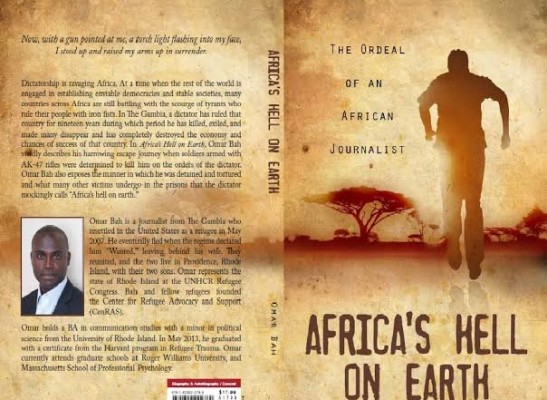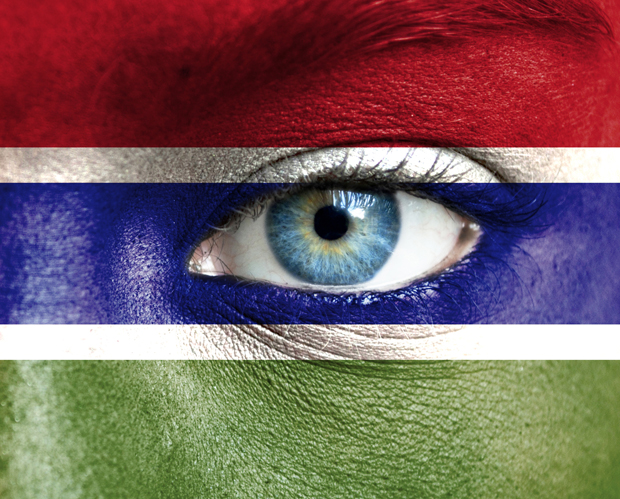Index relies entirely on the support of donors and readers to do its work.
Help us keep amplifying censored voices today.

Driven into exile by the brutal regime of Gambia’s president, Yahya Jammeh, journalist Omar Bah’s dramatic flight from his homeland is recounted in his memoir Africa’s Hell on Earth: The Ordeal of an African Journalist.
An outspoken critic of the country’s autocratic ruler, Bah was forced to flee Gambia for neighbouring Senegal, where he was welcomed by other Gambian exiles who had settled in Dakar. Later, his path led him to Ghana and eventual resettlement in the US.
“I wanted to use my new found freedom in America to speak up because I regained the voice I lost. The book is my source of rejuvenation, my symbol of refusal to be silenced, and the avenue to continue to expose corruption, mismanagement, torture, repression, killings and the general dictatorship in The Gambia. I feel I owe it to the suffering people in The Gambia”, he stated.
Bah fell from grace after he was suspected of the being an informant for US-based Freedom, an online news site critical of the Jammeh regime, while working for the pro-government Daily Observer newspaper.
As a US resident, Bah says he feels challenged to speak about the injustices and give a voice to the voiceless since he now has the ability to speak up against the dictatorship in the Gambia without fear of reprisal.
“The name of this book, Africa’s Hell on Earth, refers to the nickname of the infamous Gambian prisons where so many people have disappeared. The prisons are overcrowded, and there are lots of diseases, torture, executions and suffering. Worse still, majority of the detainees are there simply because they oppose the regime. The Gambian dictator, Yahya Jammeh, has ruled for nineteen years. During this period, he has killed, tortured and exiled many Gambians.”
He said the Gambia is a country where is so much poverty while the powers that be live in luxury without regard to the poor and sick population. The writer bemoaned the situation of the Gambian people, who are subjected to summary executions if they dare oppose the regime.
In a review of Bah’s book Demba Ali Jawo, a former president of the Gambia Press Union, described it as an accurate depiction of the obstacles Gambian journalists have faced since the Jammeh regime came to power. Jawo called the book an invaluable reference for those interested in documenting the atrocities being committed against innocent Gambians by their own government.
According to Jawo, Bah narrowly escaped a dragnet that had been thrown around the Gambian capital, Banjul, to arrest him. A soldier let Bah pass through a checkpoint.
“By letting Omar go, the soldier not only risked his own job and life, but he also had to forego promotion and even compensation if he had handed him over to the authorities”, Jawo observed.
Bah now lives in Rode Island with his wife and two sons is attending graduate school through scholarship. He is the founder of the Center for Refugee Advocacy and Support and represents the state of Rode Island and the Northeast region at the Washington-based UNHCR Refugee Congress.
“When I look back at my journey, I feel my struggle was worth it. Despite the danger I had put myself in, and all that I went through, the nation of the United States of America, out of all the countries in the world, gave me the opportunity to begin a second life. Today, I feel my new life in America, though just starting, has been dearly meaningful. I am thankful to this country.”
He advised fellow refugees and immigrants make use of the opportunities that they have in the US and remember that there are millions who remain in the camps with no hope of rebuilding their lives.
This article was published on March 3, 2014 at indexoncensorship.org

What was seen as a turning point for press freedom in the Gambia has turned out to be nothing more than political gimmicks. Barely three weeks after Gambia’s president Yahya Jammeh announced the lifting of the ban on two private media institutions — the Standard Newspaper and Terranga FM — the government arrested two journalists.
Journalists Musa Sherriff — a Gambia-based Liberian journalist who doubles as editor and publisher of the Voice newspaper — and Sainey Marenah — a freelance journalist — were being held at a police station in Sanyang Village in Kombo South few miles away from the capital Banjul. Both have been bailed as of Friday.
The arrests were made in connection to an article published in the Voice’s 11 December 2013 edition which stated that 19 Green Boys — youth supporters of the ruling Alliance for Patriotic Reorientation and Construction APRC — had defected to the opposition United Democratic Party.
Sherriff and Marenah have been charged under the criminal code with providing false information to the public, according to the Committee to Protect Journalists. “The charges against Musa Sherriff and Sainey Marenah are a reminder that the Gambia government is determined to stamp out criticism and crush the independent press,” said Peter Nkanga of the New York based CPJ’s West Africa consultant. “We call on the authorities to withdraw all charges and release the two journalists immediately.”
If convicted the journalists face five years in jail or a fine of 50,000 dalasis (about $1,515).
The two journalists, who were arrested Monday, 13 January, have been transferred to the police headquarters in the capital, Banjul. Colleagues of the journalists told media sources that Sherriff and Marenah were held in mosquito-infested cells at the police headquarters.
Late last year the National Intelligence Agency (NIA) arrested Ebrima Solo Sandeng, the secretary general of the opposition UDP youth wing and seven others. Sandeng and colleagues were charged with “unlawful assembly” following a meeting Tanji in the Kombo District. The police slapped the opposition leader with an additional charge of “giving false information” for saying the police of Tanji that arrested them are the same police who granted them a permit to hold the youth meeting.
A UDP supporter Lasana Jobarteh, who provided network coverage for the online papers at the Serekunda and Brikama rallies in the regional capital of West Coast region, has been picked up by NIA officials. Jorbateh was in a convoy with opposition leaders to and from the Brikama Rally. After eight days of detention at the NIA headquarters in Banjul without access to family and friends, Jobarteh arraigned before Magistrate Ebrima Kijera of the Bundung Magistrates’ Court on Monday, 23 December and charged with broadcasting without license through Skype. He denied any wrong doing.
According a Gambian online newspaper Jobarteh is an IT expert and had worked for the Gambia Radio Television Services (GRTS) as an audio and video expert before falling out with the government. He sued the government for wrongful termination. He reportedly won his case and was compensated for his alleged termination. He briefly left the Gambia for the US and but later returned.
President Jammeh’s earlier announcement on the lifting of the ban on two private media institutions was applauded by the Gambia Press Union and international press freedom advocates, while they also called on the President Jammeh to lift the ban on the Daily News.
Demba Ali Jawo, a Gambian Journalist who is also the former president of the Gambia Press Union welcomed the move but questioned the president’s decision to continue the Daily News ban.
Terranga Fm, the Standard Newspaper and Daily News were ordered to cease operation in September 2012 by President Jammeh for coverage of the much talked about execution of nine death row inmates in Gambia.
However, his announcement on the lifting of a ban of private media institutions turned out to be simple rhetoric. President Jammeh has clearly shown the world that he cannot tolerate divergent views in the Gambia which he claims is democratic.
Jammeh often warns journalists, accusing some of being “mouthpiece of opposition parties.”
This article was posted on 20 January 2014 at indexoncensorship.org